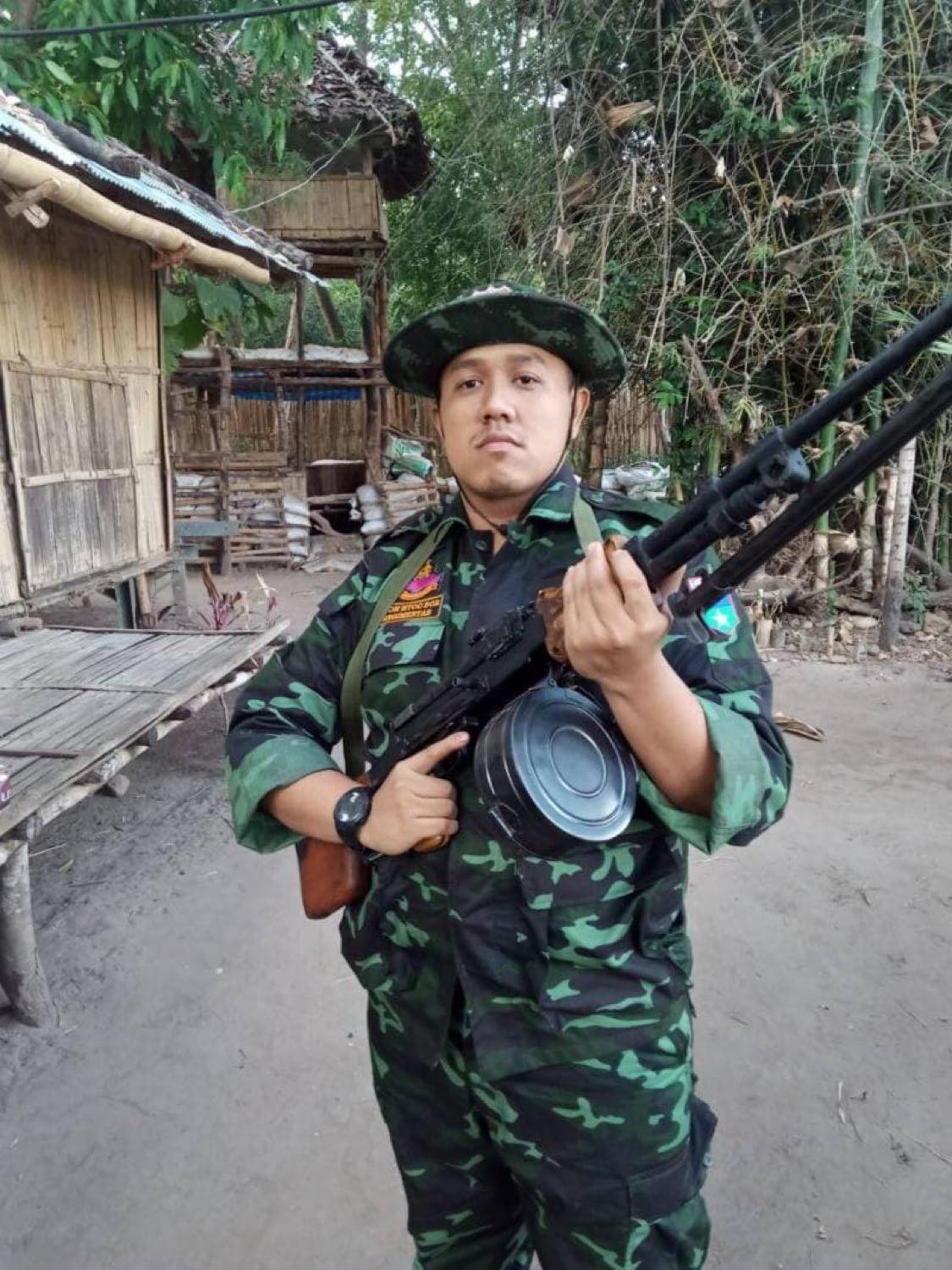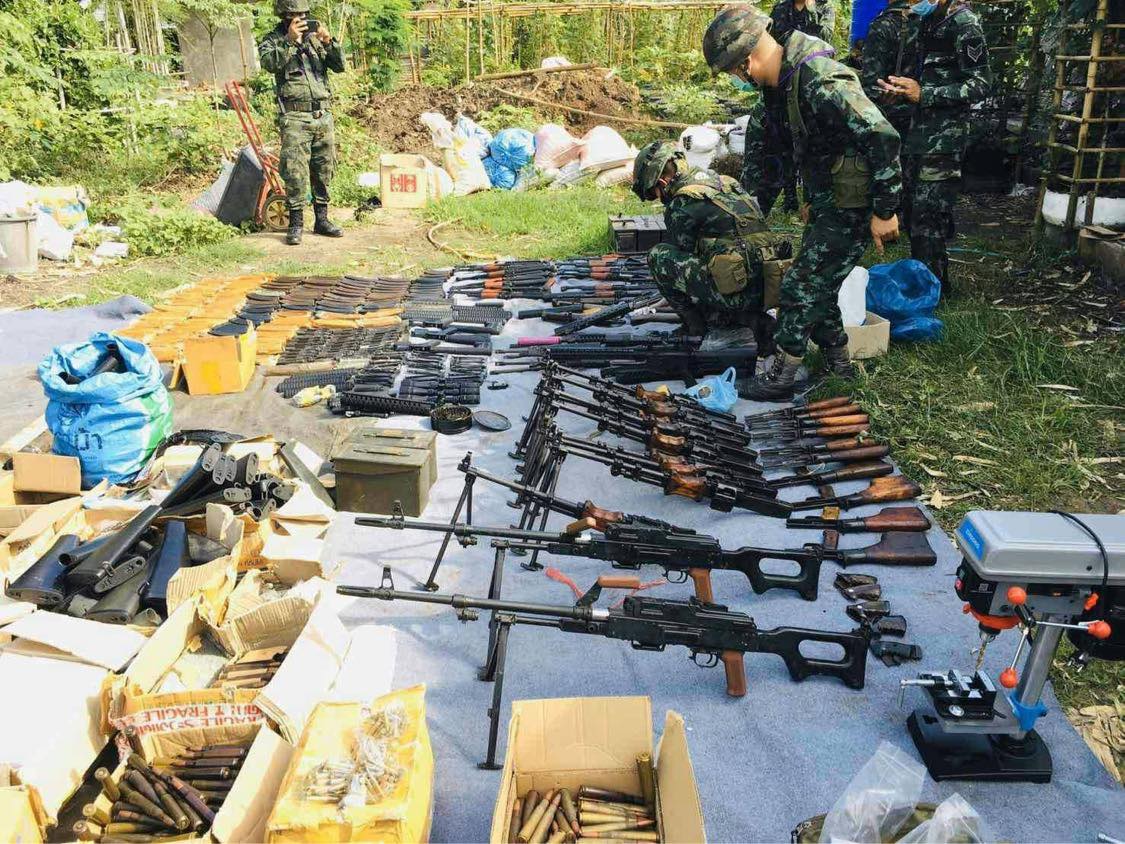In late June, Thai officials intercepted a shipment of weapons in the town of Mae Sot across the border from Myawaddy in Myanmar’s Karen State. They seized a large cache of brand-new Chinese-made weapons and detained two Thai citizens.
The June 23 joint raid targeted a house in Mae Tao, in Tak Province’s Mae Sot district.
Two Thai nationals, Sadayu Wutthichai, 39, and Apichai Sirithai, 27, were arrested and 33 war weapons, including M16, M79, M5.56 and AK47 automatic rifles and machine guns, were seized.
Thai authorities investigating the weapons shipment have since made additional arrests. According to initial reports, six suspects from Myanmar were arrested at the Mae La refugee camp around 65 km from Mae Sot. Four are ethnic Karen and two are ethnic Rakhine. The two Thai nationals who were arrested were taken to Bangkok, but since then news about the weapons haul has dried up.
Soon after the arrests, Thai police chief Police General Chakthip Chaijinda voiced suspicion that the arms were intended for use in stirring up a fresh round of political chaos within Thailand, and said police were expanding their investigation.
According to well-informed intelligence sources in Thailand and Myanmar, however, the story is different. In fact, the seized weapons belonged to the Democratic Karen Benevolent Army (DKBA) and were ultimately destined for Rakhine State bordering Bangladesh.
Based along the Thai-Myanmar border, the DKBA is an ethnic armed group with more than 10 battalions based in Karen and Mon states. Originally known as the Democratic Karen Buddhist Army, the group changed its name in 2015. The DKBA is currently a stakeholder in and signatory to Myanmar’s Nationwide Ceasefire Agreement (NCA).

Arming the AA and ARSA
Intelligence sources revealed that the seized weapons were destined for Rakhine State, where the Arakan Army (AA) and Arakan Rohingya Salvation Army (ARSA) ordered the weapons through their connections with the DKBA.
In Myanmar, both the AA and ARSA are designated as terrorist organizations.
As for the two Thai nationals, Sadayu is a Thai army veteran. According to the intelligence sources, Apichai is a Thai-Karen and a member of the DKBA.
The AA has been engaged in clashes with Myanmar’s armed forces in Rakhine since 2014, and these have escalated recently. Sources say AA insurgents previously received arms and ammunition from agents working along the Thai-Myanmar border. It is also believed that several of the previous arms shipments were sent to Rakhine State through Mae Sot.
After the seizure of the large cache in June, Karen sources on the border said that in the past several years, arms have been sent through the Mae Sot-Myawaddy border to Indian insurgents based in Sagaing Region, along Myanmar’s northwestern border with India. According to the Karen sources, these days, Rakhine and Indian insurgents are two of the main buyers of arms from various sources in the region, and Rakhine insurgents have lately ordered more machine guns and sniper rifles.
Military intelligence officers with knowledge of arms smuggling in Myanmar said many arms shipments have been made to Rakhine State from areas on the Thai and Chinese borders. To facilitate delivery, smugglers bribe security officials at checkpoints. Ethnic insurgents, police, soldiers and customs officials are known to take bribes in exchange for allowing trucks or vehicles to pass through unchecked. However, the amounts of the bribes vary, the intelligence officers said.
Besides the two Thai nationals, informed intelligence sources on the border said some Pakistani men were also involved in procuring the weapons seized in Mae Sot. These men are believed to have previously lived in Cambodia before moving to Thailand, raising questions about larger underground networks and terrorism links in the region.
In February 2017, the Bangkok Post published a report, “Tracing the path of terror home,” citing security reports that several criminal suspects in Thailand had potential links to fighters belonging to ISIS and al-Qaeda.
It briefly mentioned suspicions of a “secret training base” near Mae Sot: “Investigators found a space being used as an ostensible training ground.”
The Post added, “A foreign intelligence agency found several illegal activities to be taking place in the area, including bomb making.” The Thai army subsequently cleared the area.
The report also mentioned a man named Hayi Rasak (his nationality was not disclosed) who was arrested in Thailand on suspicion of working with the AA.
The same report mentioned the arrest of two Pakistani nationals in Mae Sot and said Thai security agencies were keeping a close watch on some Pakistani nationals whom the Thais suspected of involvement in transnational crimes. A large number of Thai and Myanmar Muslims (including Rohingya) as well as Pakistanis live in Mae Sot, many of them involved in selling second-hand Japanese cars to the Myanmar market. However, due to ongoing security concerns and the suspected involvement of some members of this community in passport forgery, Thai police and intelligence agencies monitor the activities of Pakistanis living in Mae Sot.

Myanmar intelligence sources also believe AA members are living and operating in areas controlled by Karen insurgents. In the past, members of the Arakan Liberation Army were stationed in areas controlled by the Karen National Liberation Army (KNLA), with whom they were allied; they still live along the border.
Karen sources said several AA members have established a training camp inside KNLA territory. The Karen National Union/KNLA signed a ceasefire agreement with the government in 2012. However, Karen leaders face ongoing internal rifts and are divided; it is possible that some Karen commanders sympathetic to the AA may be providing them with a camp or space inside KNLA territory.
This month, 21 international humanitarian organizations working in Myanmar issued a statement urging the military and the AA to stop further escalation of the conflict in Rakhine State, to protect civilians and to adhere to international humanitarian law.
“As international humanitarian organizations working with communities throughout Rakhine State, we express deep concern for all those affected by the upsurge in fighting between the Arakan Army (AA) and the Myanmar Military in northern Rakhine State,” their statement read.
In early April, a group of 18 ambassadors to Myanmar also called for an end to armed conflicts in the country during the COVID-19 pandemic and urged all armed groups to protect civilians. The AA is well equipped and has the cash and resources to buy arms. It can also rely on support and arms from some ethnic allies in Myanmar. In a comment apparently targeted at China, commander-in-chief Senior General Min Aung Hlaing said while visiting Russia last month that the Myanmar military suspects rebel groups including the AA continue to be armed from across the Myanmar-China border.
There are significant differences between ARSA and the AA, however. Despite its blanket denials, ARSA has been accused of having connections with foreign extremist groups. Abdus Qadoos Burmi, a Pakistani of Rohingya descent based in Karachi who is considered the group’s mentor, has called for “jihad” in Myanmar and has well-documented links to Lashkar-e-Taiba (LeT), one of South Asia’s largest Islamic terrorist organizations, whose operations are based mainly in Pakistan.
LeT was founded in Afghanistan in 1987 with funding from now-deceased al-Qaeda founder Osama bin Laden. Abdus Qadoos has even appeared at meetings with LeT supremo Hafiz Mohammed Syed. (LeT is no stranger to Mae Sot, either. In the past, the group has been involved in providing explosives training to Sikh militants along the border between Myanmar and Thailand.)
ARSA has received donations and training from broader Islamist terror networks in East Asia and militants in Bangladesh. Its leader, Attah Ullah, was born in Pakistan and raised in Saudi Arabia. ARSA is smaller than the AA and now targets mainly soldiers and police officers in northern Rakhine.
Some foreign observers remain skeptical of ARSA’s Islamist connections, though they agree that regional radical Islamist groups including LeT have full sympathy for the Rohingya cause. They acknowledge there is a growing possibility that ARSA will adjust and bring its methods in line with those of militant Islamist groups, or that militant Islamist groups will conduct violence on its behalf.
In the past, ARSA has targeted Rakhine, Hindu, Mro and other ethnic groups in northern Rakhine State and is responsible for a well-documented massacre. In 2016 and 2017, ARSA also launched a series of coordinated attacks on border guard forces, civilians and police.
ARSA massacred some 99 Hindus, including women and children, and abducted a number of others, in August 2017, as documented by Amnesty International and news media groups.
It then launched daring attacks on more than 30 police posts and an army base in Rakhine, resulting in the deaths of dozens of ARSA insurgents as well as security personnel.
Responding to the massacre and attacks, Myanmar armed forces backed by Rakhine politicians and vigilantes launched military operations against the insurgents and civilians, in the process committing mass atrocities that the United Nations declared to have “genocidal intent”.
As the Myanmar military continues to engage Rakhine insurgents and fights occasional clashes with ARSA, the insurgents are seeking more arms. This means further orders of weapons and ammunition are surely in the pipeline.
You may also like these stories:
Chinese-Made Arms Due for Myanmar Seized on Thai Border
Myanmar Military: Rakhine Internet Blackout Still Required to Protect Military Secrets

















